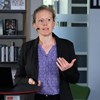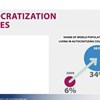arisen
Rectifying Secondary Climatic Injustices
In: Mosquera, J. & O. Torpman (ed.),Studies on Climate Ethics and Future Generations vol. 6. Working Paper Series 2024:10–17 Abstract Due to faulty planning or unforeseeable contingencies, policies u
The Origins and Maintenance of Female Genital Modification across Africa
Bayesian Phylogenetic Modeling of Cultural Evolution under the Influence of Selection Human Nature, 27(2), 173-200. DOI 10.1007/s12110-015-9244-5 Abstract We present formal evolutionary models for the oristratification appear to play a more important role in the cross-cultural distribution of FGMo. To explain these cases, one must consider cultural evolutionary explanations in conjunction with behavioral ecological ones.We conclude with a discussion of the implications of our study for policies designed to end the practice of FGMo.
Jules Holroyd: Holding each other accountable for implicitly biased behaviour
Jules Holroyd, Assistant Professor at the Faculty of Arts at the University of Nottingham. ABSTRACTMany of us will have implicit racial biases: dispositions to certain affective or cognitive responses
The Pragmatics of Obscuring in Political Philosophy
Journal of Applied Philosophy Abstract According to the obscuring objection against mainstream political philosophy, there has been a long-standing dominant research paradigm focusing on distributive ju

Bilden av Sverige – en förebild eller ett land i kris?
På senare tid har flera beskrivit Sverige som ett land i kris. Inte sällan kopplas krisen till svensk integrationspolitik. Samtidigt får vi rapporter om att mycket överlag har blivit bättre i dagens S

När använder vi artificiell intelligens (AI) och vad innebär det?
En effekt av coronakrisen är att alltfler både arbetar och träffas online. Redan innan krisen använde 78 procent internet i arbetet. Dock uppgav bara 16 procent att de nyttjade AI där. Detta tyder på

What Future for Social Investment?
In a period of deep crisis, the question arises as to what kind of new strategies should be implemented to recover stronger growth, more and better jobs, and more equality and social cohesion. Reflexi

Anna Lührmann: Walking the Talk. Which Parties Threaten Democracy?
The recent increase of democratic declines around the world has sparked a new generation of studies on the topic. Scholars agree that these days the main threat to democracy arises from democratically
Edward Page: Addressing future loss and damage associated with climate change
Edward Page, Associate Professor of Political Theory, University of Warwick ABSTRACTClimate change, by damaging the quality of life of populations already suffering from acute vulnerability and hardshi the adoption of measures of mitigation and adaptation and a ‘second-order injustice’ if the associated losses and damages arise as of these measures. Both forms of injustice involve ‘losses and damages’ arising that would not have occurred but for climate change but raise distinct normative problems given their diverging origins. This research seminar explores some key normative puzzles raised by the new ethics and politics of ‘loss and damage’ as it relates to both first-order and second-order climate change injustice. In particular, the lecture focuses on which normative principles should guide measures seeking to address first-order and second-order climate change injustices experienced by states and how (if at all) new forms of policy can be designed that respect these principles.
Completed: Criminal networks and social organizing
How does criminal organization, for example in street gangs, arise? By understanding how the networks work, we can also suggest crime prevention strategies.








